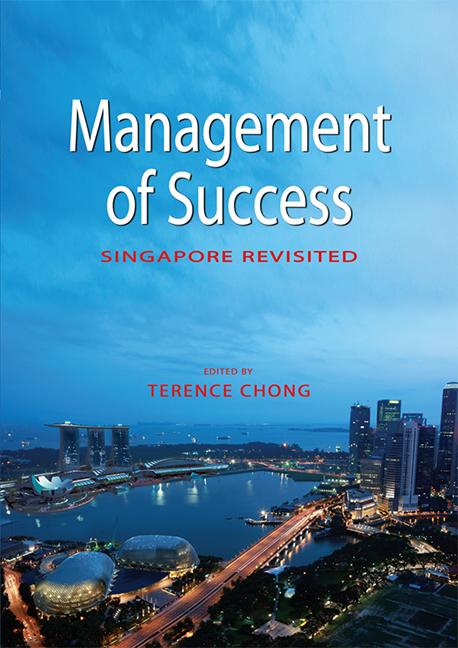Book contents
- Frontmatter
- Contents
- List of Tables and Figures
- Foreword
- Message
- Quote
- Preface
- The Contributors
- 1 Introduction: The Role of Success in Singapore's National Identity
- SECTION 1 SINGAPORE IN THE BIGGER PICTURE
- SECTION 2 LEADERSHIP, POLICY AND POLITICS
- SECTION 3 THE RESTRUCTURING OF THE ECONOMY
- SECTION 4 THE TRANSFORMATION OF SOCIETY
- SECTION 5 THE LAW
- SECTION 6 MODIFICATION OF THE ENVIRONMENT
- SECTION 7 COMMUNITY AND NATIONAL SECURITY
- SECTION 8 LIFE IN SINGAPORE
- 26 Culture, the Arts and the Global City
- 27 Fluid Nation: The Perpetual “Renovation” of Nation and National Identities in Singapore
- 28 Suffer the Rebellious Children: The Politics of Remaking Singapore and the Remaking of Singapore Politics
- 29 “It's Like Rice on the Table, It's Our Common Dish”: The English Language and Identity in Singapore
- 30 Multiculturalism and the Problem of Solidarity
- 31 Sexual Governance and the Politics of Sex in Singapore
- 32 Conclusion
- Index
32 - Conclusion
from SECTION 8 - LIFE IN SINGAPORE
Published online by Cambridge University Press: 21 October 2015
- Frontmatter
- Contents
- List of Tables and Figures
- Foreword
- Message
- Quote
- Preface
- The Contributors
- 1 Introduction: The Role of Success in Singapore's National Identity
- SECTION 1 SINGAPORE IN THE BIGGER PICTURE
- SECTION 2 LEADERSHIP, POLICY AND POLITICS
- SECTION 3 THE RESTRUCTURING OF THE ECONOMY
- SECTION 4 THE TRANSFORMATION OF SOCIETY
- SECTION 5 THE LAW
- SECTION 6 MODIFICATION OF THE ENVIRONMENT
- SECTION 7 COMMUNITY AND NATIONAL SECURITY
- SECTION 8 LIFE IN SINGAPORE
- 26 Culture, the Arts and the Global City
- 27 Fluid Nation: The Perpetual “Renovation” of Nation and National Identities in Singapore
- 28 Suffer the Rebellious Children: The Politics of Remaking Singapore and the Remaking of Singapore Politics
- 29 “It's Like Rice on the Table, It's Our Common Dish”: The English Language and Identity in Singapore
- 30 Multiculturalism and the Problem of Solidarity
- 31 Sexual Governance and the Politics of Sex in Singapore
- 32 Conclusion
- Index
Summary
In the penultimate chapter in the 1989 volume of Management of Success, the editors made several observations which bear revisiting. Their observations quite adequately described the Zeitgeistof the late 1980s; a time when Singapore was emerging from a recession, exploring new growth industries, and in anticipation of political transition. Revisiting these observations, and adding a few of our own will, it is hoped, present an intellectual and policy-making trajectory between 1989 and the present, while also reserving analytical space for scholars of tomorrow to address the questions that cannot be answered today.
One key impression from the 1989 volume is the centrality of the People's Action Party (PAP) government to Singaporean life. According to Sandhu and Wheatley, “Little is denied to those who command the relevant knowledge, dispose of the necessary power, and possess the requisite will; and the Singapore Government has manifested all three qualities in good measure.” After twenty years, this is still generally the case although there are some crucial differences. The PAP government continues to possess the “relevant knowledge” today in a variety of fields from the economy, niche industries, research and development, security and so on, by earnestly engaging the appropriate experts, and studying the experiences and models offered by others. As Sandhu and Wheatley note: “The point is that the government has habitually sought, discussed, and evaluated the best advice obtainable at a particular time.” This was true then, and it remains so today. Nevertheless, the world today is vastly different from what it was in 1989 given the intensity of the internal globalization of the national economy resulting in the unravelling socio-political consequences of foreign labour, the widening wage gap, the dependence on foreign capital, and external globalization in the form of systematic state investments overseas. The ramifications of globalization are still unfolding. Given Singapore's ever-deepening ties to the global economy the sheer number of possible outcomes makes the notion of “relevant knowledge” rather, well, irrelevant. This uncomfortable fact of life has been acknowledged by the civil service elites. Head of civil service Peter Ho, borrowing American philosopher Nassim Nicholas Taleb's phrase, warns that “As more black swans appear, they will transform the world we live in, in unrecognisable ways that we cannot fully predict.”
- Type
- Chapter
- Information
- Management of SuccessSingapore Revisited, pp. 594 - 606Publisher: ISEAS–Yusof Ishak InstitutePrint publication year: 2010

